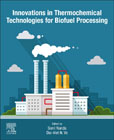
Innovations in Thermochemical Technologies for Biofuel Processing
Nanda, Sonil
Vo, Dai-Viet N.
Innovations in Thermochemical Technologies for Biofuel Processing broadly covers current technologies in alternate fuels and chemical production, a few of which include biomass-to-liquid, biomass-to-gas and gas-to-liquid biomass conversion technologies. The topics in this book include elaborative discussions on biomass feedstocks, biomass-to-liquid technologies (liquefaction, pyrolysis and transesterification), biomass-to-gas technologies (gasification), gas-to-liquid technologies (syngas fermentation and Fischer-Tropsch synthesis), co-processing technologies, fuel upgrading technologies (hydrotreating and reforming), novel catalyst development for biorefining, biorefining process optimization, unit operations, reaction kinetics, artificial neural network, and much more. The book comprehensively discusses the strengths, weaknesses, opportunities and threats of notable biofuels (e.g., bio-oil, biocrude oil, biodiesel, bioethanol, biobutanol, bio-jet fuels, biohydrogen, biomethane, synthesis gas, hydrocarbon fuels, etc.). Addresses solutions for clean fuel, energy security, waste management, waste valorization, reduced greenhouse gas emissions, carbon capture and sequestration, circular economy and climate change mitigation Includes applications of thermochemical conversion and reforming technologies for waste biomass to biofuels Covers current technologies in alternate fuels and chemicals production, a few of which include conversion technologies (i.e., liquefaction, gasification, pyrolysis, torrefaction, transesterification, organic transformation, carbon-carbon and carbon-heteroatom coupling reactions, oxidation, and reforming processes, etc.), hydrotreating technologies (i.e., hydrogenation, hydrodesulfurization, hydrodenitrogenation, hydrodearomatization and hydrodemetalization) and catalytic processes. INDICE: Section 1: Biomass Feedstocks: Classification, Characterization and Candidacy 1. Recent progress in the characterization of feedstocks and products for design and optimization of biomass thermochemical conversions 2. State-of-the-art approaches in biomass conversion to fuels and chemicals 3. Upcycling biomass resources into fuels and chemicals to support sustainability Section 2: Biomass-to-Liquid, Biomass-to-Gas and Gas-to-Liquid Technologies 4. Production of solid fuel and bio-oil for energy application via slow, fast and intermediate pyrolysis processes 5. Progress in biomass fast pyrolysis technique: Outlook of modern experimental and theoretical approaches 6. Biofuel production with integrated pyrolysis and catalytic upgrading system 7. Thermochemical valorization of oil palm biomass to value-added products: A biorefinery concept 8. Progress of biomass air gasification to produce energy-dense synthesis gas 9. Hydrothermal gasification of biomass and organic wastes for hydrogen production: Advances, Challenges and Prospects Section 3: Reforming and Fuel Upgrading Technologies 10. Clean and sustainable biofuels through syngas fermentation: Challenges and opportunities 11. Hydrogen and carbon co-generation from catalytic methane decomposition: Current progress and future trends 12. Artificial neural network modeling method for forecasting syngas generation from reforming processes 13. Carbon-based catalyst in the production of biodiesel: A review 14. Upgrading bio-hydrogenated diesel from palm-fatty acid with self-reliable hydrogen synthesis
- ISBN: 978-0-323-85586-0
- Editorial: Elsevier
- Encuadernacion: Rústica
- Páginas: 338
- Fecha Publicación: 25/03/2022
- Nº Volúmenes: 1
- Idioma: Inglés
